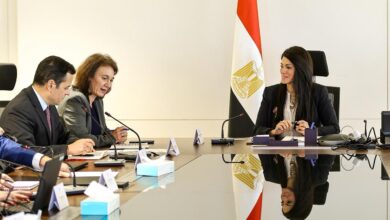
Sometimes I am a dreamer. I reject reality because life is bigger than it, and I think we live a fleeting moment in the age of time, and there will come another moment with a different reality and a new life, and we will have a president walks on the approach of Taha Hussein, who famously said: “I see through the others.”
A president does not find it objectionable to seek the help of the people with knowledge and experience, instead of the people he trusts and cronies. A president finds richness in difference and merit in diversity. And because I am a dreamer as I said before, I imagine that the upcoming president may read these suggestions and benefit from it. It is a compilation of advice which has been presented time and time again, but repetition educates the intelligent, and hope does not die.
(1)
When asked by US journalist Jeffrey Goldberg: “What would you advise the 45th [US] president to do first?”, Henry Kissinger, an American diplomat who served as the US Secretary of State, responded by saying: The president should ask, “What are we trying to achieve, even if we must pursue it alone?” before adding, “What are we trying to prevent, even if we must combat it alone? The answers to these questions are the indispensable aspects of our foreign policy, which ought to form the basis of our strategic decisions.”
This question needs to be asked of the forthcoming Egyptian president, and the answer must be clear in their mind. It should reach all Egyptians in order that we can know exactly who our supporting allies are, who are neutral in regard to us, and who are hostile to us. The upcoming president should be committed in their strategy to construct a clear criteria based on Egyptian interests and the values which they adhere to.
(2)
Promote education. Egypt cannot emerge from its economic slum and decades of underdevelopment without good compulsory education.
A good compulsory educational system cam change the country’s perception of the importance of education. Since the implementation of ‘Economic Infitah’ – the open-door policy of former-President Anwar Sadat, which was described by writer Ahmed Bahaa al-Din as “the limitless openness,” – our society’s perceived value of science and education has declined against increasing a tendency to pursue rapid results, which are often achieved through twisted and illegal ways. This mentality, which can be found lurking in all elements of society, has paved the way for the culture of corruption, bribery, and nepotism in Egypt.
The state that praises the value of science and celebrates scientists should demonstrate this by deeds, not merely words. It could begin by implementing an extensive media campaign celebrating knowledge and education, restoring them to their worthy positions. Simultaneously, the state should modernize the national curricula, build new schools, pay attention to teacher development, and implement non-traditional methods of educating, using the information technology and smart-communication devices.
(3)
Respect freedoms and human rights, they are the safety valve in any society and the real way to stability, and they help establish a concept of citizenship.
I am surprised by the state’s commitment to the International Monetary Fund’s (IMF) model and its implementation: floating the national currency, cutting essential subsidies to basic services, and privatization without opposition, while simultaneously rejecting any criticism from established international human rights organizations against the situation of human rights and freedoms in the country, regarding it as interference in a country’s internal affairs and seeking to excuse itself from international norms by repeating the line that each society has its own characteristics.
(4)
Work hard to improve the quality of life.
Focusing on the completion of mega-projects without paying attention to improving people’s quality of living means individuals will not feel any positive impact of economic growth.
The problem of cleanliness in Egypt and the alleviation of the pollution in the capital can be initiated by establishing public parks in neighborhoods, particularly poor areas and slums which suffer from this the most.
Taking interest in the dissemination of a culture of beauty, like by beautifying public squares and erecting statues across them would help people feel the impact of a growing economy. As would solving the traffic crisis and improving the public transport system and trains – whose condition is simply miserable and overcrowded.
Alleviate the suffering of citizens through government institutions by implementing the e-government project; corruption, bribery, and nepotism are troubling people’s lives, and fighting them firmly and resolutely will generate loyalty among people. Find quick solutions to the rampant unemployment, end obstacles to small projects, control the markets, and control the greed of merchants, so that people don’t suffer from the shortage in basic commodities and the continuous rise in prices.
(5)
Pay attention to the soft power which Egypt yields, like our art, culture, Al-Azhar, media, and tourism. Tourism is not only a source of income, but Egyptian monuments are part of Egypt’s foreign image and its soft power, as it boasts ancient historic civilization. The obstacles that distort this image must be removed. Soft power should be embodied in providing a model of good life to be followed, and successful economic experiences, and a system of values that correspond to the cultural and religious heritage of our society and system of contemporary values.
(6)
The Egyptian army should not be tasked by burdens and responsibilities that are not part of its basic functions. It may contribute to the decline of its appreciation by the public. Egypt’s army is strong and its mission to preserve homeland and secure its borders, as well as providing security within the country if exposed to any threats to its security and stability.
(7)
The Ministry of Information should return, so that its minister can be given responsibility for the development of Egypt’s media strategy, especially since most of the media are now affiliated with state institutions.
The multiplicity of bodies and authorities directing the media has meant the Egyptian media functions in a state of chaos, it is like a huge body without a head. With a Ministry of Information, there will be a designated institution and individuals to help fix the issue and be held accountable for any such failures.
(8)
Enhance transparency and freedom of information.
Egypt is deprived from freedom of information and transparency, and this leads to the rumors forming and circulating, as well as opens the doors for administrative and financial corruption, and affects foreign investments and domestic confidence in government.
Transparency is the first way to build trust between the people and the executive.
(9)
Communicate directly with the people, set a date for the president to present a summary of what has happened during the past period, respond to public issues, and talk about decisions and actions which you intend to implement in the future.
(10)
The final suggestion is: Do not rejoice with the office. Do not grieve it, if it would have lasted for the previous one, it wouldn’t has been reached you. may God help you.




